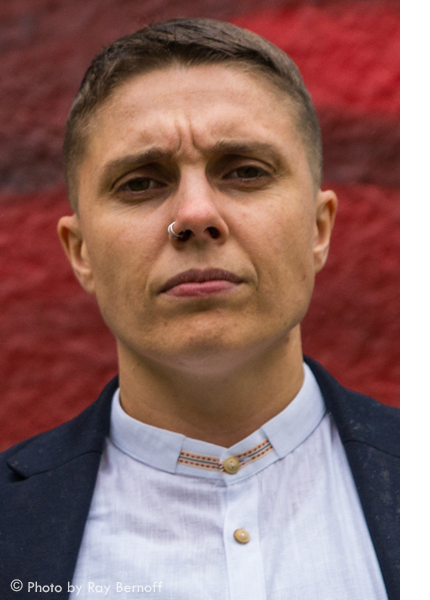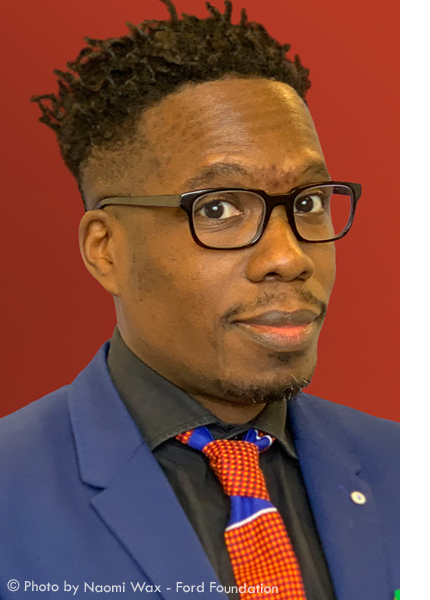Every year, EFF invites the world to the Pioneer Award Ceremony to recognize leaders on the electronic frontier who are extending freedom and innovation in technology. Beginning with nominations from the public, EFF awards Barlow statuettes to both luminary individuals and groups whose contributions may be technical, social, legal, academic, economic, or cultural. Join us!
This event has now passed
Date: Thursday, September 16, 2021
Time: 5:00 pm - 7:00 pm Pacific Time
We are proud to present the 2021 award recipients:
Kade Crockford
ACLU Advocate Reining in Government Use of Face Surveillance
Pam Dixon
Champion of Privacy Rights Research
Matt Mitchell
Data Security Trainer Protecting Black Communities
And joining us as this year's keynote speakers, Annalee Newitz and Charlie Jane Anders!

Red at left: Annalee Newitz. Pink at right: Charlie Jane Anders. Photo credit: Sarah Deragon
Special thanks to for supporting EFF and the 2021 Pioneer Award Ceremony. If you or your company are interested in learning more about sponsorship, please contact Nicole Puller.
Want to support EFF's work? Check out our awesome EFF gear and donate at eff.org/PAC-join.
Watch:
EFF Livestream Page
Simulcasts: Twitch, Facebook Live, Twitter, and YouTube Live.
A recording will be available after the program on YouTube.
Accessibility:
The award ceremony will be live-captioned. Once the stream begins, captions will appear beneath the video stream on this page, or you can click here to view captions in a new window. A transcription of the stream will be available post-event.
If you need accommodations or have accessibility questions prior to the event, please contact hannah.diaz@eff.org.
EFF is dedicated to a harassment-free experience for everyone, and all participants are encouraged to view our full Event Expectations.
Questions? Email us at events@eff.org.
More About the 2021 Winners
& Keynote Speakers
Kade Crockford

Activist Kade Crockford is a leader in educating the public about and campaigning against mass electronic surveillance. At the ACLU of Massachusetts, they direct the Technology for Liberty Project, which focuses on ensuring that technology strengthens rights to free speech and expression and is not used to impede our civil liberties, especially privacy rights. Crockford focuses on how surveillance systems harm vulnerable populations targeted by law enforcement—people of color, Muslims, immigrants, and dissidents. Under Crockford’s leadership, the Technology for Liberty Project has used public record requests to shine a light on how state and local law enforcement agencies use technology to surveil communities. Crockford oversaw the filing of over 400 public record requests in 2019 and 2020 seeking information about the use of facial recognition across the state, collecting over 1,400 government documents. They led successful efforts in Massachusetts to organize local support for bans on government use of face surveillance, convincing local police chiefs that the technology endangered privacy in their communities. Crockford worked with seven Massachusetts cities to enact preemptive bans against the technology and, in June 2020, working with youth immigrants’ rights organizers, succeeded in getting facial recognition banned in Boston, the second largest city in the world to do so at the time. Massachusetts lawmakers have credited Crockford for shepherding efforts to pass a police reform bill that reins on how police in the state can use facial recognition. They also led a project to file public record requests with every Massachusetts District Attorney and the state Attorney General to reveal how local prosecutors were using administrative subpoena, secretly and with no judicial review or oversight, to obtain people’s cell phone and internet records. Kade has written for The Nation, The Guardian, The Boston Globe, WBUR, and many other publications, and runs the dedicated privacy website www.PrivacySOS.org.
Pam Dixon

Author and researcher Pam Dixon has championed privacy for more than two decades and is a pioneer in examining, documenting, and analyzing how data is utilized in ways that impact multiple aspects of our lives, from finances and health information to identity, among other areas. Dixon founded the World Privacy Forum in 2003, a leading public interest group researching consumer privacy and data, with a focus on documenting and analyzing how individuals’ data interacts within complex data ecosystems and the consequences of those interactions. She has worked extensively on privacy and data governance in the U.S., EU, India, Africa, and Asia. Dixon worked in India for a year researching and publishing peer-reviewed research on India’s Aadhaar identity system, which was cited twice in the Supreme Court of India’s landmark Aadhaar decision. She works with the UN and WHO on data governance, and with OECD in its One AI Expert Group. She was named a global leader in digital identity, which included her work in Africa on identity ecosystems. She is co-chair of the Data for Development Workgroup at the Center for Global Development, where she is working to bring attention to inequities faced by less wealthy countries with fragile data infrastructures when dealing with data privacy standards created by, and reflecting the priorities of, wealthy countries. Dixon co-authored a report in 2021 calling for a more inclusive approach to data governance and privacy standards in low- and middle-income countries. Her ongoing work in the area of health privacy is extensive, including her work bringing medical identity theft to public attention for the first time, which led to the creation of new protections for patients. She has presented her work on privacy and complex data ecosystems to the Royal Society, and most recently to the National Academy of Sciences.
Matt Mitchell

Matt Mitchell is the founder of CryptoHarlem and a tech fellow for the BUILD program at the Ford Foundation. He is recognized as a leading voice in protecting Black communities from surveillance. Under his leadership, CryptoHarlem provides workshops on digital surveillance and a space for Black people in Harlem, who are over policed and heavily surveilled, to learn about digital security, encryption, privacy, cryptology tools, and more. He is a well-known security researcher, operational security trainer, and data journalist whose work raising awareness about privacy, providing tools for digital security, and mobilizing people to turn information into action has broken new ground. His work, Mitchell says, is informed by the recognition that there’s a digital version of “stop and frisk” which can be more dangerous for people of color than the physical version, and that using social media has unique risks for the Black community, which is subject to many forms of street level and online surveillance. CryptoHarlem has worked with the Movement for Black Lives to create a guide for protestors, organizers, and activists during the 2020 protests against police brutality following the murder of George Floyd. Last year he was selected as a WIRED 25, a list of scientists, technologists, and artists working to make things better. In 2017 he was selected as a Vice Motherboard Human of The Year for his work protecting marginalized groups. As a technology fellow at the Ford Foundation, Mitchell develops digital security training, technical assistance offerings, and safety and security measures for the foundation’s grantee partners. Mitchell has also worked as an independent digital security/countersurveillance trainer for media and humanitarian-focused private security firms. His personal work focuses on marginalized, aggressively monitored, over-policed populations in the United States. Previously, Mitchell worked as a data journalist at The New York Times and a developer at CNN, Time Inc, NewsOne/InteractiveOne/TVOne/RadioOne, AOL/Huffington Post, and Essence Magazine.
Annalee Newitz and Charlie Jane Anders
The keynote speakers this year will be science fiction authors Annalee Newitz and Charlie Jane Anders, hosts of the award-winning podcast “Our Opinions Are Correct.”

